|
Genres, Themes, Actors, and Directors:
- Akim Tamiroff Films
- Betty Hutton Films
- Brian Donlevy Films
- Comedy
- Do-Gooders
- Pregnancy
- Preston Sturges Films
- Romantic Comedy
- Small Town America
Response to Peary’s Review:
Peary refers to this “wild Preston Sturges comedy” as “border[ing] on being tasteless”, and argues that the “frenetic comedy with rapid-fire dialogue doesn’t reach [the] sophistication of other Sturges films”. While acknowledging that the “dialogue is clever” and that there are “moments of genuine hilarity”, he ultimately feels it’s “a bit smutty”. I disagree. Sturges’ ability to milk the letter of the Production-Code-law to such an outrageous degree — she got married, didn’t she? so what does it matter that she wasn’t actually “conscious” or conscientious at the time, and essentially gave up her virginity to a stranger? — is absolutely priceless, and a great deal of the fun to be had lies in appreciating his clever work-arounds. Meanwhile, the casting of hapless Eddie Bracken as Hutton’s eventual romantic partner is inspired; Peary says he “wishes Bracken’s Norval Jones weren’t such a pushover” but this is precisely what his role calls for — and he certainly steps up when needed.
Hutton’s “hyperkinetic” energy is perfectly suited for her role here; she definitely shows off her comedic chops, and while we have a hard time liking or respecting her at first, she eventually grows on us. Meanwhile, William Demarest as her “highly excitable policeman father” and Diana Lynn as her “shrewd younger sister” (giving a “surprisingly amusing portrayal”, reminiscent of her similar role in 1942’s The Major and the Minor) represent one of the most refreshingly “authentic” father-daughter pairings in early Hollywood. Widowed Demarest never stops lamenting the challenges of raising two daughters on his own:
“The trouble with kids is they always figure they’re smarter than their parents — never stop to think if their old man could get by for 50 years and feed ’em and clothe ’em, he maybe had something up here to get by with — things that seem like brain twisters to you might be very simple for him.”
While Hutton is busy being “hyperkinetically” distracted by her seemingly hopeless predicament, Lynn remains remarkably unperturbed as her father snipes lines like the following at her: “Listen, Zipper-puss! Some day they’re just gonna find your hair ribbon and an axe someplace. Nothing else! The Mystery of Morgan’s Creek!” (Yeah right, Dad. Moving on the matter at hand…)
Note: The “miracle” itself (devised by Sturges in the midst of production) is a cleverly outrageous one; don’t read anything at all about this film online if you wish to remain surprised.
Redeeming Qualities and Moments:
- Betty Hutton as Trudy Kockenlocker
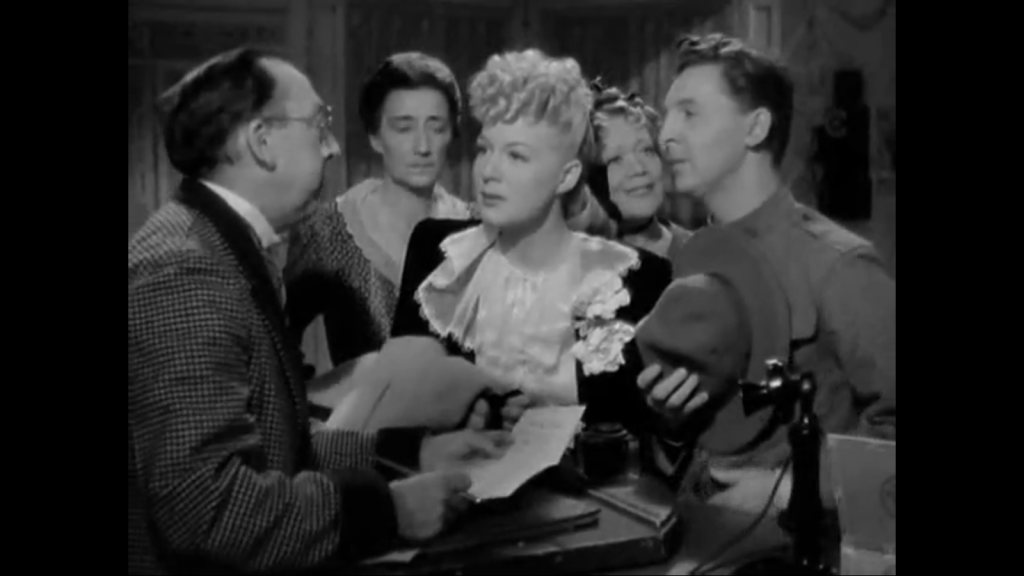
- Eddie Bracken as Norval Jones
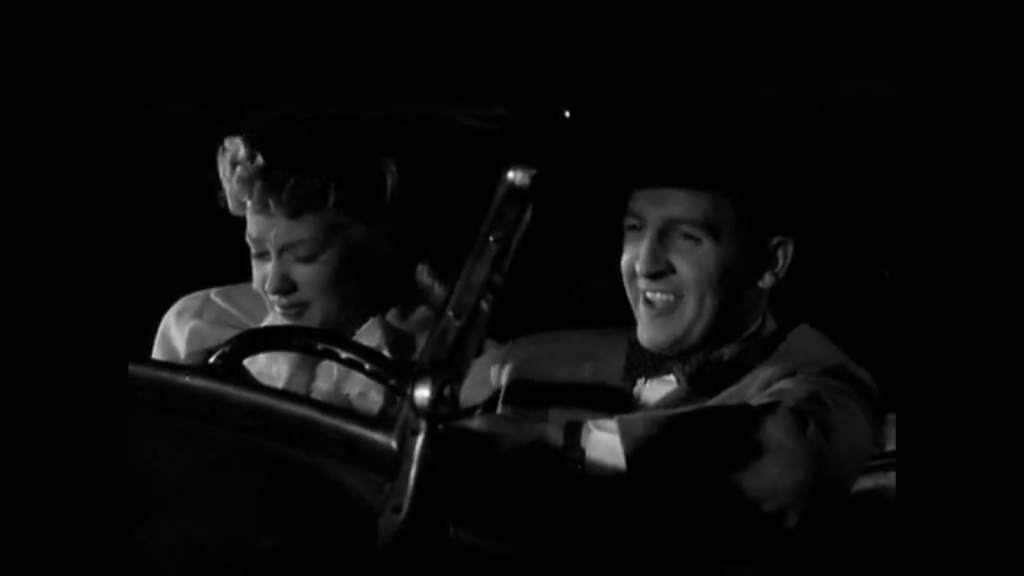
- Diana Lynn as Emmy Kockenlocker
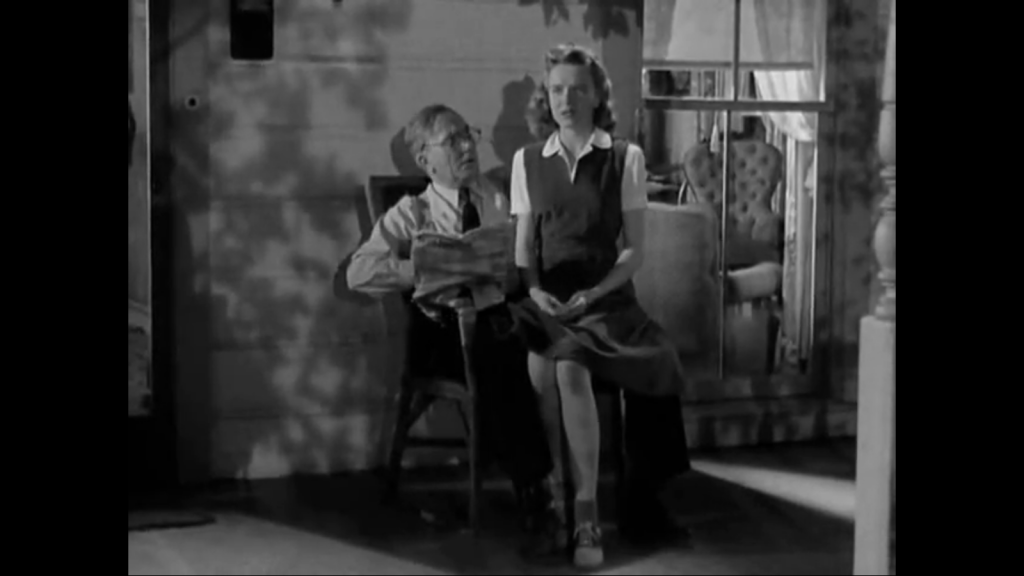
- William Demarest as Trudy and Emmy’s dad
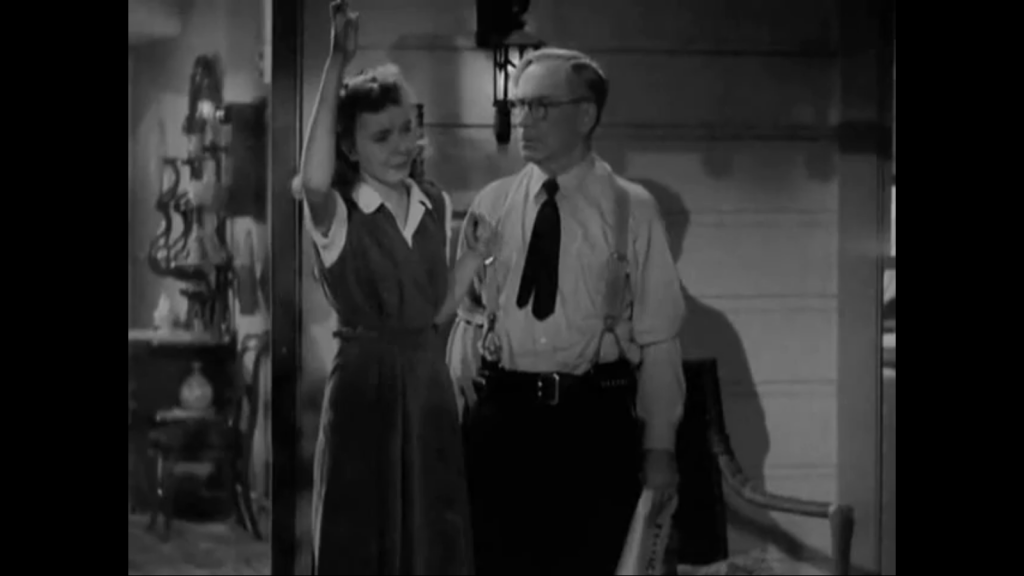
- Sturges’ fast-paced, consistently hilarious, surprisingly risque screenplay
Must See?
Yes, as one of Sturges’ funniest masterpieces.
Categories
- Genuine Classic
- Important Director
Links:
|
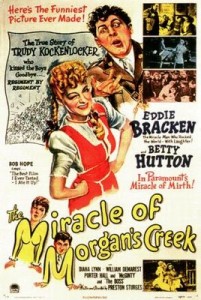




One thought on “Miracle of Morgan’s Creek, The (1944)”
A once-must, at least, for its place in cinema history, Sturges’ assured direction of a (rather) successful script, and for the fine performances.
This isn’t one of my favorite Sturges films – but it didn’t surprise me to learn that it was Paramount’s highest-grossing film of the year, playing in some places to SRO audiences. It’s understandable that it’s regarded as one of the writer/director’s best films – there’s lots to recommend it along those lines (and it has a crowd-pleasing premise and conclusion). I’m just hesitant to be that enthusiastic.
It seems to me that the film takes more time than necessary to really get rolling. There’s a lot of set-up – which is not uncommon for something that’s a farce (which this is), but much of the set-up here is not really needed for the pay-off (ultimately) and what happens in the first 30 minutes or so is not Sturges at his comic best as a writer.
Things do change at that point. The first really funny scene occurs when Hutton and Lynn consult a quick-talking-and-thinking lawyer to discuss Hutton’s predicament. This is soon followed by a sort of centerpiece in the film – with the wacky proposal scene between Hutton and Bracken. Later on, we also get two wonderful scenes that play to Sturges’ strength: when he makes chaos ensue while a bunch of peripheral characters are all talking over each other.
Still, there are also elements which don’t seem to work all that well. I’ve already mentioned the somewhat-ponderous way it opens – but, as well, Sturges has made Bracken’s character someone who stutters – which leans toward being played to death. ~as does a very lengthy sequence late in the film when Demarest tries and fails in repeated attempts to inspire Bracken to ‘forcefully’ break out of jail. (We’re supposed to suddenly think that Bracken’s character is dim-witted – which has never been the case.)
Reservations aside, though – the film (which caused something of an uproar on moral grounds – why?! – when it was released) is still very entertaining for the most part. Sturges again demonstrates his singular ability in encouraging actors to play comedy with wild abandon, and the ensemble effort is admirable.
(Though I generally like what Hutton and Bracken do here, they are also carrying the weight of some of the less-successful aspects of the script. Maybe that’s why I prefer Demarest and Lynn here: those two don’t seem to be let down by anything in their written roles.)